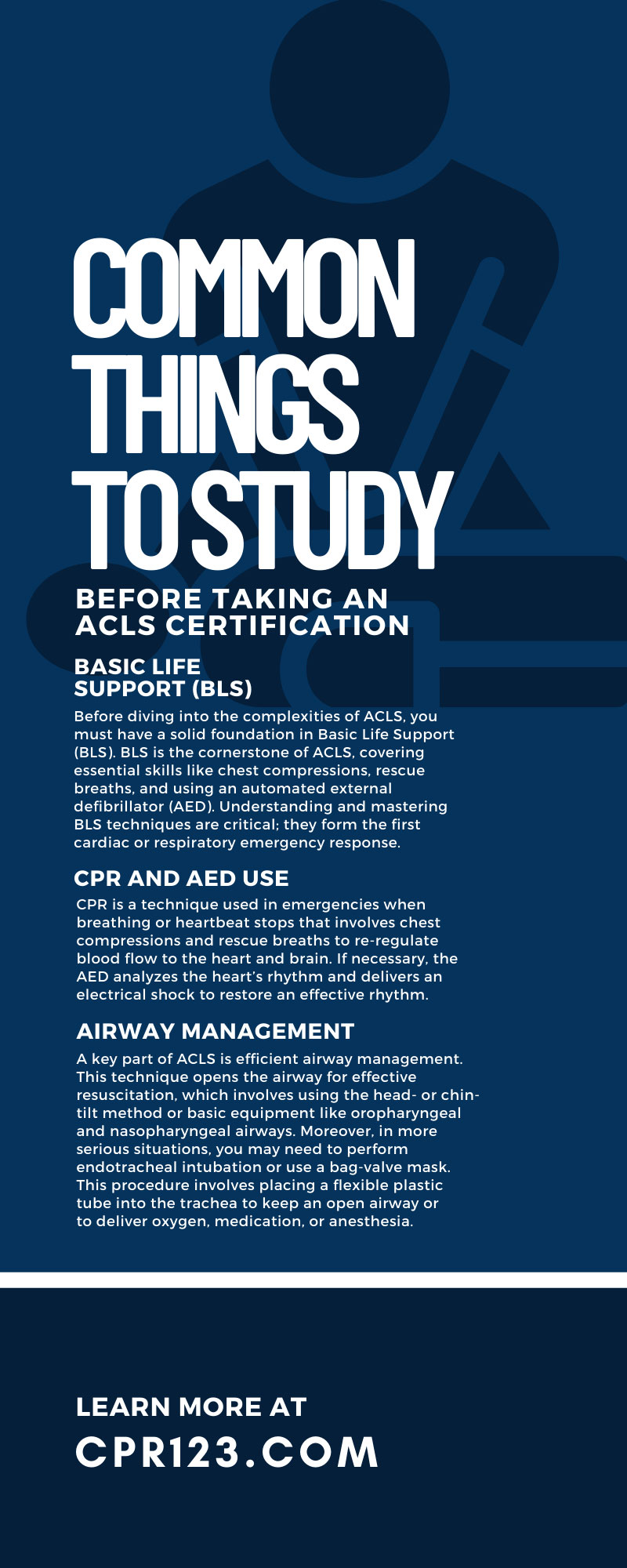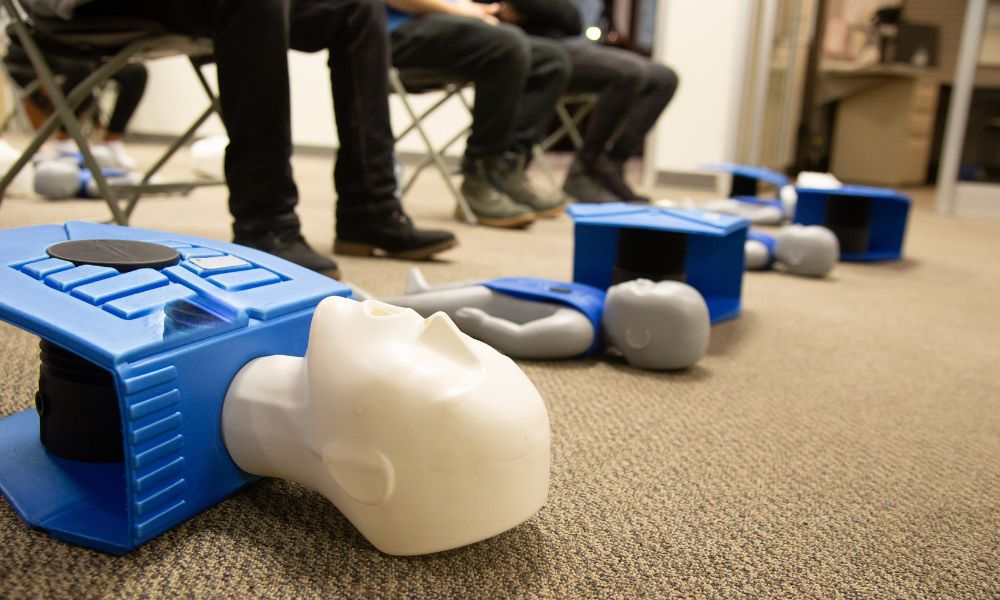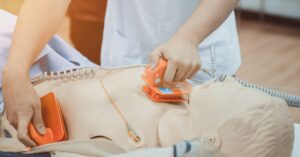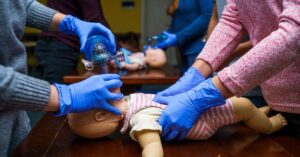Diving headfirst into Advanced Cardiovascular Life Support (ACLS) certification can feel like plunging into a deep, swirling vortex of medical jargon, complex procedures, and tricky test questions. It’s like stepping onto a roller-coaster blindfolded—you never quite know what’s coming next. While it’s an endeavor that demands a fair bit of grit and determination, it’s also absolutely surmountable. The key to success? A solid foundation of study on common topics, of course! So get ready to indulge in every study session on the common things to study before taking an ACLS certification.
Basic Life Support (BLS)
Before diving into the complexities of ACLS, you must have a solid foundation in Basic Life Support (BLS). BLS is the cornerstone of ACLS, covering essential skills like chest compressions, rescue breaths, and using an automated external defibrillator (AED). Understanding and mastering BLS techniques are critical; they form the first cardiac or respiratory emergency response. As you embark on your ACLS journey, work on your BLS skills.
CPR and AED Use
Before pursuing an ACLS certification, students must master Cardiopulmonary Resuscitation (CPR). CPR is a technique used in emergencies when breathing or heartbeat stops that involves chest compressions and rescue breaths to re-regulate blood flow to the heart and brain. If necessary, the AED analyzes the heart’s rhythm and delivers an electrical shock to restore an effective rhythm.
Airway Management
A key part of ACLS is efficient airway management. This technique opens the airway for effective resuscitation, which involves using the head- or chin-tilt method or basic equipment like oropharyngeal and nasopharyngeal airways. Moreover, in more serious situations, you may need to perform endotracheal intubation or use a bag-valve mask. This procedure involves placing a flexible plastic tube into the trachea to keep an open airway or to deliver oxygen, medication, or anesthesia. Mastering these procedures is vital, as any delay or obstruction in airway management can lead to severe outcomes.
Cardiovascular Pharmacology
An integral part of ACLS training is understanding cardiovascular pharmacology. This topic involves understanding the different medications used in cardiac life support. Key drugs include vasopressors like epinephrine—which increases heart rate and blood pressure—and antiarrhythmics like amiodarone—which manages irregular heart rhythms. Additionally, knowledge of opioids like morphine for pain management in acute coronary syndromes is essential. The successful application of these medications can ease stability and recovery during a cardiac emergency.
Post-Cardiac Arrest Care
Post-Cardiac Arrest Care is crucial in ACLS. After successfully resuscitating a patient, health-care providers must start comprehensive procedures and treatments to optimize outcomes and reduce recurrence risk. This care phase significantly affects neurological and functional recovery. Key aspects include perfecting hemodynamic stability, identifying and controlling the cause of cardiac arrest, and managing complications. Effective Post-Cardiac Arrest Care involves a multidisciplinary approach, including intensive care, cardiology, neurology, and rehabilitation.
Stroke Management
Stroke management is crucial in ACLS training. One of the things you’ll learn is how a stroke starts and how to make a swift response to minimize brain damage. Recognizing signs of stroke-like facial drooping, arm weakness, and speech difficulties is essential to know if someone is about to go unconscious. Study up on how to perform CPR on an unresponsive patient and notify the stroke team swiftly.
Acute Coronary Syndromes Management
Acute coronary syndromes (ACS) involve sudden, reduced blood flow to the heart. They include unstable angina, ST-segment elevation myocardial infarction (STEMI), and non-ST-segment elevation myocardial infarction (NSTEMI). As part of ACLS training, you need to be able to recognize and manage these syndromes effectively. Acknowledging and managing symptoms includes understanding the pathophysiology, recognizing symptoms, interpreting electrocardiograms, and starting appropriate treatment, such as aspirin and beta-blockers.
Studying Tips for Each Section
Effective studying tips are crucial for maximizing the benefits of ACLS certification. These tips supply practical guidance to make study sessions more efficient and targeted. Breaking down complex content and focusing on key concepts improves knowledge retention and boosts confidence in handling real-world cardiac emergencies. These tips are your roadmap to ACLS certification success.
Basic Life Support (BLS)
For this section, ensure you have direct practice, as theory alone won’t make you proficient. Practice chest compressions and rescue breaths on a CPR dummy to get comfortable with the techniques. Don’t forget to revise the correct ratio of compressions to rescue breaths.
CPR and AED Use
Similar to BLS, practical experience is crucial. Familiarize yourself with the steps and the rhythm of CPR, and ensure you know how to use an AED. You might find it useful to watch demonstration videos or partake in role-play scenarios.
Airway Management
Study diagrams to understand the structure of the airway. Practice the head-tilt and chin-lift methods and use basic equipment. For more advanced techniques like endotracheal intubation, try to gain firsthand experience under supervision.
Cardiovascular Pharmacology
Flashcards can be immensely beneficial for memorizing different drugs, their uses, dosages, and side effects. Break down the information into digestible chunks and review it regularly to commit it to memory.
Post-Cardiac Arrest Care
Understanding this section requires a good grasp of the cardiac arrest chain of survival. Focus your study on each component of Post-Cardiac Arrest Care and understand the reasons for each step.
Stroke Management
Remember the acronym ‘FAST’ (Face, Arms, Speech, Time) to help you quickly recognize the symptoms of a stroke. Visual learning aids can help you understand the different types of strokes and appropriate responses.
Acute Coronary Syndromes Management
Getting a good understanding of ACS involves understanding ECG readings, which is a skill that takes time and practice. Use online resources and practice reading ECGs to boost your confidence. Ensure you know the treatments for different types of ACS and when to administer them.
Benefits of Obtaining an ACLS Certification
Achieving an ACLS certification has numerous benefits, particularly for those dedicated to saving lives in critical situations. Getting a certification in ACLS equips health-care workers with the skills they need to respond effectively to cardiac emergencies. Moreover, it expands career opportunities in the health-care sector, as many prestigious institutions seek certified professionals. Additionally, the certification improves confidence levels in high-stress environments, fostering better decision-making and communication with team members. Overall, the benefits of ACLS certification are invaluable for professionals looking to pursue more in their health-care career.
Get Your ACLS Certification With CPR123
These are some of the topics to know before taking the ACLS certification! Remember, this journey isn’t a sprint. It’s more of a marathon, where each path takes you down a topic.
Rest assured—with persistence, determination, and the right study techniques, you can do this! Now, what’s next? It’s time to translate this knowledge into action. Join us at CPR123 and explore our top-tier classroom courses for health-care providers. You won’t just learn with us—you’ll excel at saving lives! So let’s step into the world of practical, life-saving skills together!








